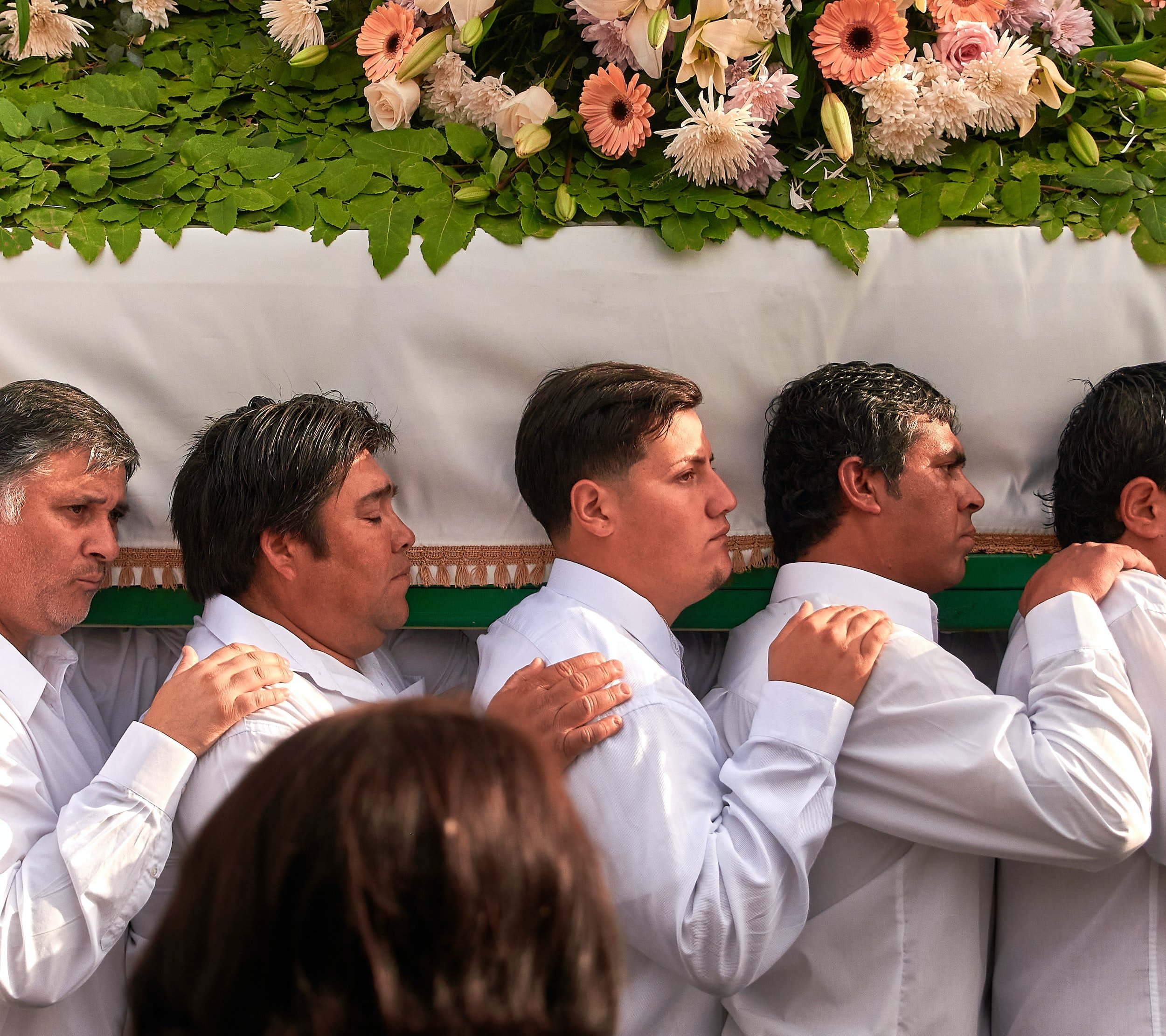Thoughts on the Death of Jacob, Our Penultimate Reading
Genesis 49:28-50:14
28 All these are the twelve tribes of Israel. This is what their father said to them as he blessed them, blessing each with the blessing suitable to him.
29 Then he commanded them and said to them, “I am to be gathered to my people; bury me with my fathers in the cave that is in the field of Ephron the Hittite, 30 in the cave that is in the field at Machpelah, to the east of Mamre, in the land of Canaan, which Abraham bought with the field from Ephron the Hittite to possess as a burying place. 31 There they buried Abraham and Sarah his wife. There they buried Isaac and Rebekah his wife, and there I buried Leah— 32 the field and the cave that is in it were bought from the Hittites.” 33 When Jacob finished commanding his sons, he drew up his feet into the bed and breathed his last and was gathered to his people.
50 Then Joseph fell on his father's face and wept over him and kissed him. 2 And Joseph commanded his servants the physicians to embalm his father. So the physicians embalmed Israel. 3 Forty days were required for it, for that is how many are required for embalming. And the Egyptians wept for him seventy days.
4 And when the days of weeping for him were past, Joseph spoke to the household of Pharaoh, saying, “If now I have found favor in your eyes, please speak in the ears of Pharaoh, saying, 5 ‘My father made me swear, saying, “I am about to die: in my tomb that I hewed out for myself in the land of Canaan, there shall you bury me.” Now therefore, let me please go up and bury my father. Then I will return.’” 6 And Pharaoh answered, “Go up, and bury your father, as he made you swear.” 7 So Joseph went up to bury his father. With him went up all the servants of Pharaoh, the elders of his household, and all the elders 42 of the land of Egypt, 8 as well as all the household of Joseph, his brothers, and his father's household. Only their children, their flocks, and their herds were left in the land of Goshen. 9 And there went up with him both chariots and horsemen. It was a very great company. 10 When they came to the threshing floor of Atad, which is beyond the Jordan, they lamented there with a very great and grievous lamentation, and he made a mourning for his father seven days. 11 When the inhabitants of the land, the Canaanites, saw the mourning on the threshing floor of Atad, they said, “This is a grievous mourning by the Egyptians.” Therefore the place was named Abel-mizraim; it is beyond the Jordan. 12 Thus his sons did for him as he had commanded them, 13 for his sons carried him to the land of Canaan and buried him in the cave of the field at Machpelah, to the east of Mamre, which Abraham bought with the field from Ephron the Hittite to possess as a burying place. 14 After he had buried his father, Joseph returned to Egypt with his brothers and all who had gone up with him to bury his father.
THOUGHTS ON THE DEATH OF JACOB, OUR PENULTIMATE READING
I have a bit more to say tomorrow about our final day’s reading, but I want to leave you with what is one of the most powerful images in all of the Bible: the burial of Jacob.
Remember, Joseph has forgiven his brothers, but they are not really reconciled with each other. Joseph, the right hand of Pharaoh himself— is living like an Egyptian, whereas Israel and his sons are living as shepherds in Goshen, sojourning in a foreign land. Joseph has settled the family there, but for all intents and purposes he is not one of them any more.
Jacob’s death, however, unites the brothers for one last time.
Jacob makes his 12 sons swear a deathbed oath (the same oath, by the way, that Joseph will subsequently make his descendants swear to him):
29 Then he gave them these instructions: “I am about to be gathered to my people. Bury me with my fathers in the cave in the field of Ephron the Hittite, 30 the cave in the field of Machpelah, near Mamre in Canaan, which Abraham bought along with the field as a burial place from Ephron the Hittite. 31 There Abraham and his wife Sarah were buried, there Isaac and 43 his wife Rebekah were buried, and there I buried Leah. 32 The field and the cave in it were bought from the Hittites.” 33 When Jacob had finished giving instructions to his sons, he drew his feet up into the bed, breathed his last and was gathered to his people. [Genesis 49-29-33]
Jacob, whose life’s journey has been long and winding, knows that his place is in the Promised Land, and so he will be buried with his fathers.
Joseph gets the necessary permission from Pharaoh and then joins the whole company as they make the long sad trek back to the land that the Lord promised Abraham.
And then we get what is one of the most moving images in the entire Bible:
12 So Jacob’s sons did as he had commanded them: 13 They carried him to the land of Canaan and buried him in the cave in the field of Machpelah, near Mamre, which Abraham had bought along with the field as a burial place from Ephron the Hittite. [Genesis 50:12-13]
Jacob’s 12 sons, erstwhile enemies in life, united in the death of their father:
The twelve sons of Jacob carry their father on their shoulders as they lay him to rest with his fathers in the land of Promise.
Wow.









